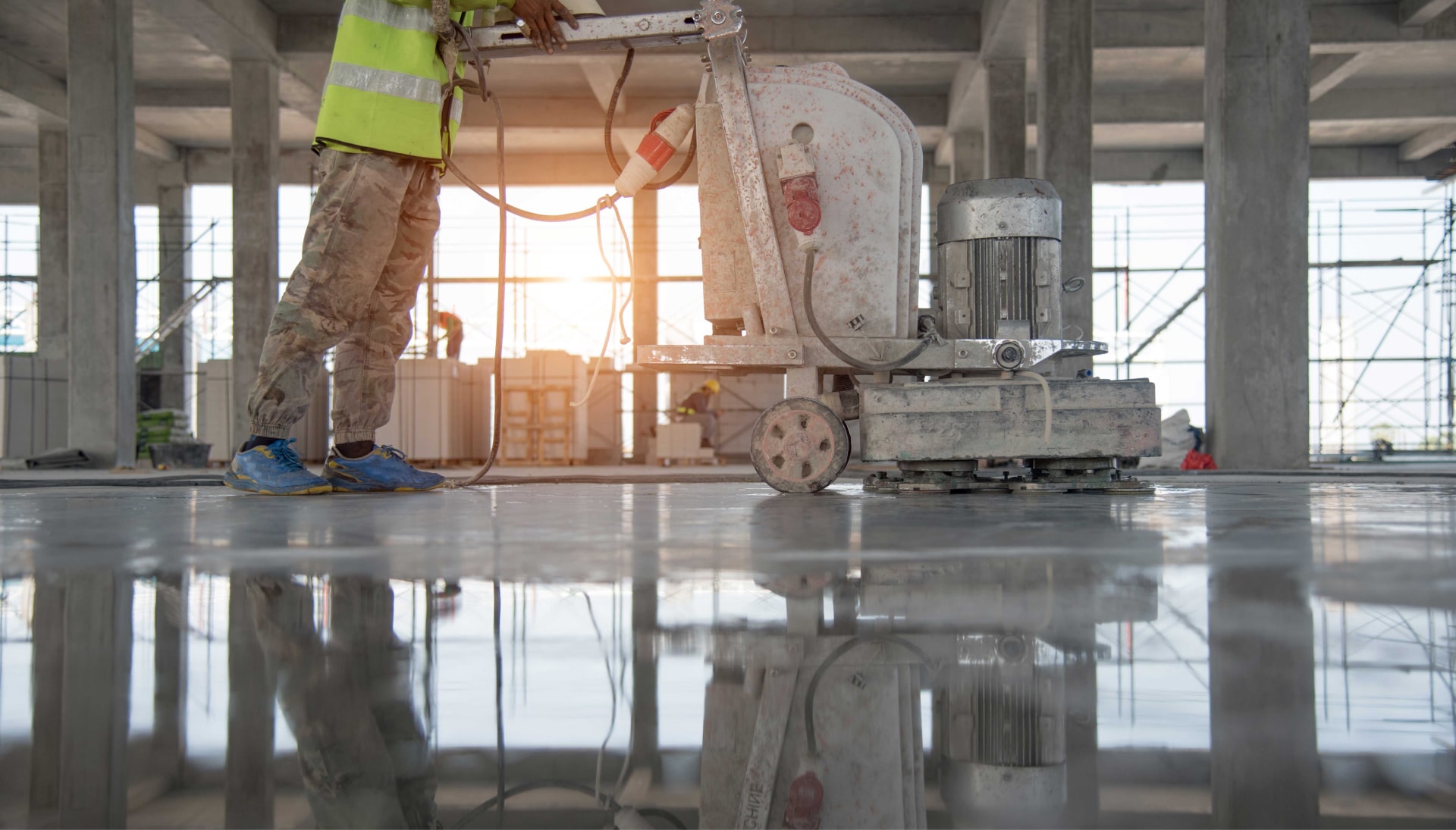Concrete Solutions for Every Need
Concrete is a foundational material in construction, valued for its strength, durability, and versatility. Whether you’re planning a new driveway, a sturdy foundation, or decorative landscaping, understanding the properties and applications of concrete is crucial for project success.
Why Choose Concrete?
- Durability: Concrete withstands harsh weather conditions and heavy use, ensuring long-lasting results.
- Versatility: It can be molded into various shapes and finishes, fitting any design aesthetic.
- Cost-Effectiveness: Concrete is an economical choice compared to other building materials, offering excellent value over time.
- Low Maintenance: Once installed, concrete requires minimal upkeep, saving you time and money.
Understanding Concrete Mixes
The strength and performance of concrete depend heavily on the mix design. A typical concrete mix includes:
- Cement: The binding agent that hardens and adheres the materials together.
- Aggregates: Sand, gravel, or crushed stone that provide bulk and stability.
- Water: Essential for the chemical reaction (hydration) that hardens the cement.
- Admixtures: Optional additives that enhance specific properties like workability, strength, or setting time.
Common Concrete Applications
Driveways and Walkways
Concrete driveways offer a smooth, durable surface that can withstand vehicle traffic and seasonal changes. Proper installation, including a well-prepared sub-base and adequate thickness, is vital for preventing cracks and settling. Walkways benefit from concrete’s stability and can be customized with various finishes to complement your landscape.
Foundations
A solid concrete foundation is the backbone of any structure. It provides a level base, distributes weight evenly, and protects against moisture and soil movement. Foundation types include:
- Slab Foundations: A single layer of concrete poured directly on the ground.
- Crawl Space Foundations: Raised foundations with a shallow space beneath the structure.
- Basement Foundations: Providing a full underground level for living or storage.
Decorative Concrete
Beyond its structural uses, concrete can be transformed into stunning decorative elements. Techniques like:
- Stamped Concrete: Patterns are pressed into the wet concrete to mimic brick, stone, or tile.
- Colored Concrete: Pigments are added to the mix to achieve a wide range of hues.
- Exposed Aggregate: The top layer of cement is removed to reveal the decorative stones within.
These methods enhance aesthetic appeal for patios, pool decks, and interior flooring.
Ensuring Quality Concrete Work
To ensure your concrete project meets expectations, consider these tips:
- Hire Experienced Professionals: Look for contractors with a proven track record and relevant certifications.
- Proper Site Preparation: Ensure the ground is properly graded, compacted, and free of debris.
- Correct Mixing Ratios: Adhere to recommended mix designs to achieve the desired strength and workability.
- Curing: Keep the concrete moist for several days after pouring to promote proper hydration and minimize cracking.
The Future of Concrete
Innovation continues to enhance concrete technology, with developments in:
- Self-Healing Concrete: Incorporating bacteria that can repair cracks automatically.
- Permeable Concrete: Allowing water to drain through, reducing runoff and improving water management.
- High-Strength Concrete: Formulations that offer superior load-bearing capacity for large-scale projects.
These advancements promise even greater durability, sustainability, and versatility in concrete construction.
By understanding the fundamentals of concrete and working with skilled professionals, you can ensure successful and long-lasting results for all your construction and landscaping projects.
Services
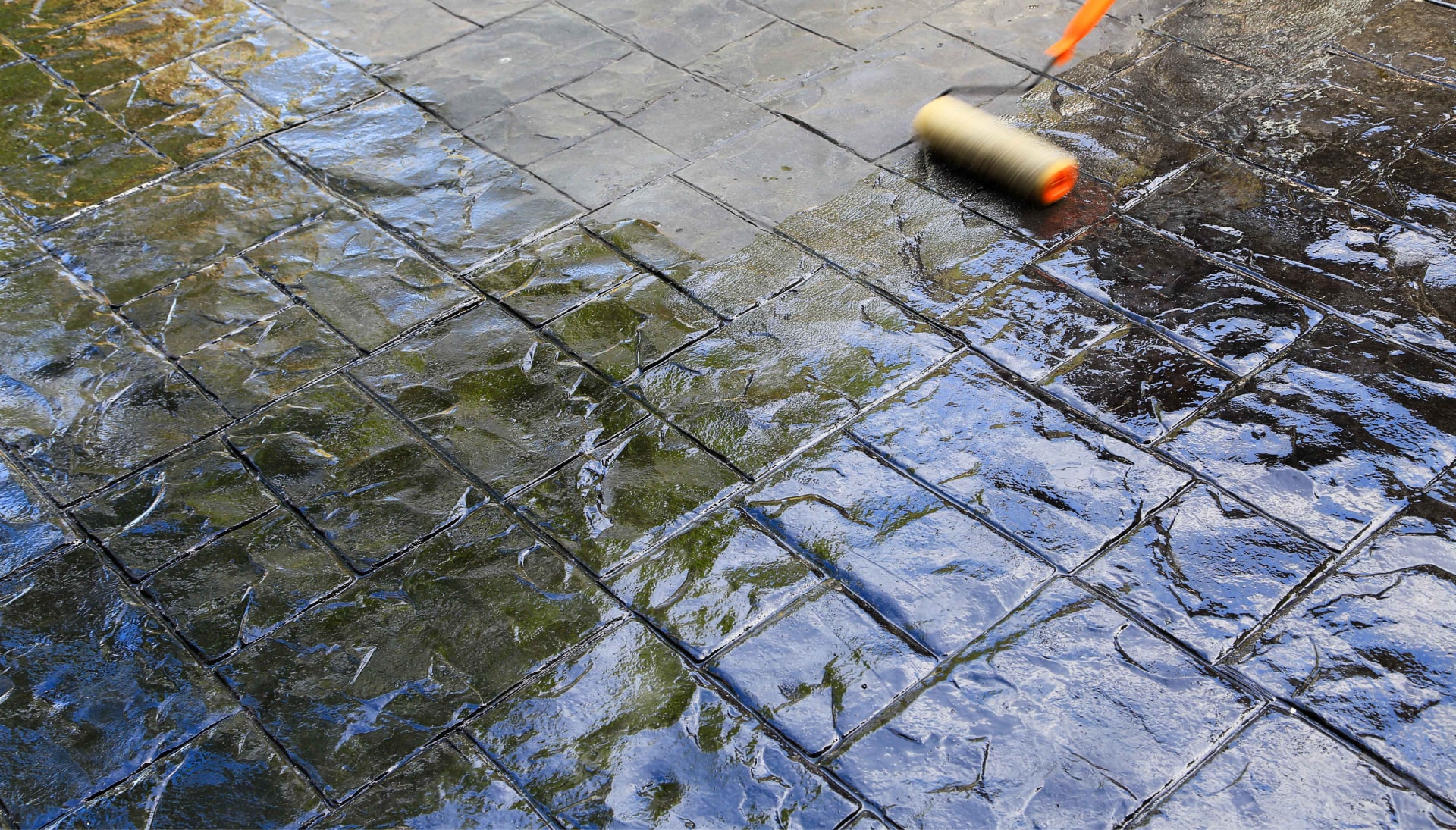
Concrete Patios in Arlington Heights
Improve the visual appeal of your commercial or residential outdoor space with a beautiful concrete patio designed by our partners.
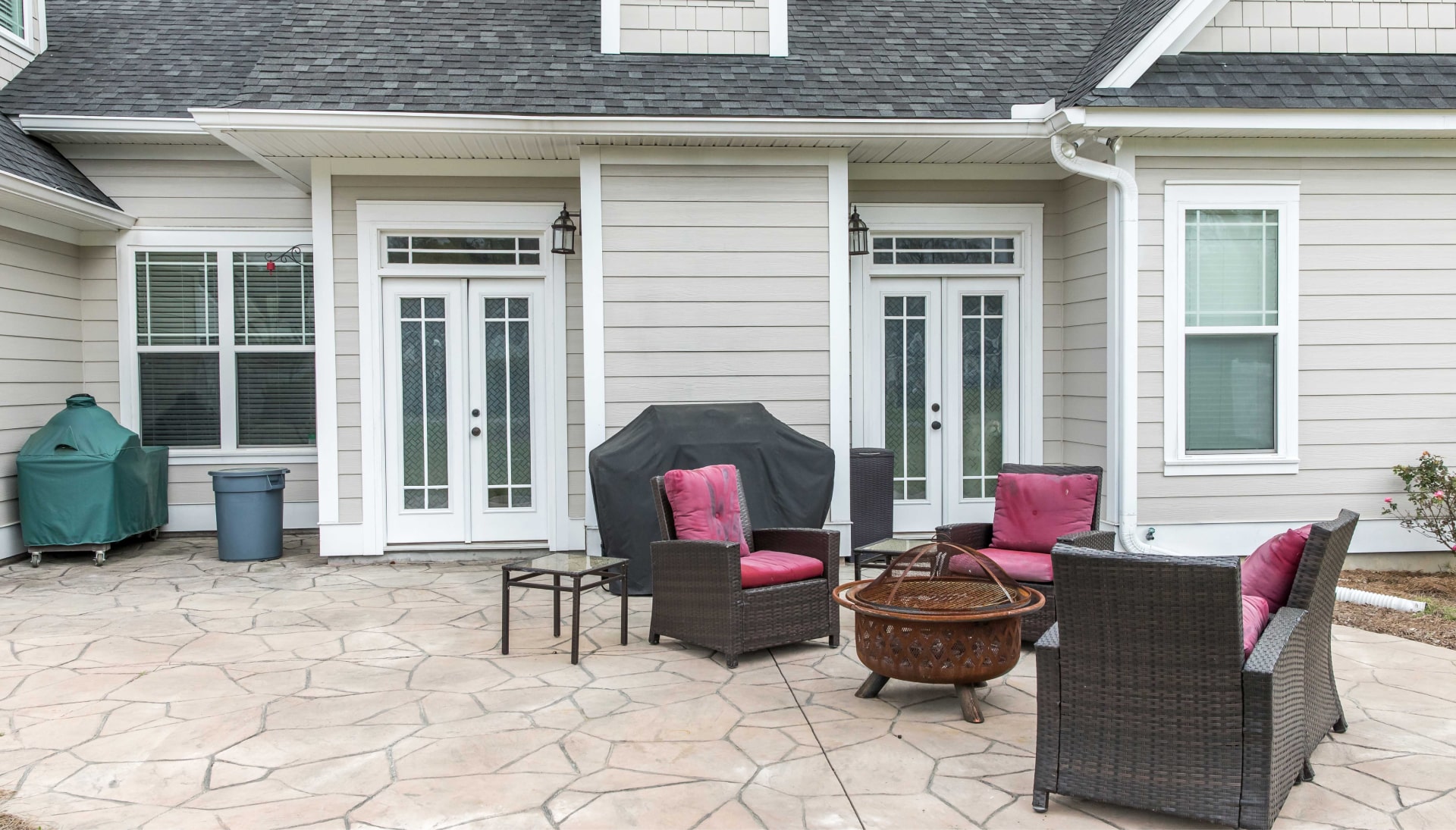
Beautiful Stamped Concrete of Arlington Heights
Go with the standard concrete look or get creative with one of the many gorgeous designs in decorative concrete that Arlington Heights, Illinois locals are loving.
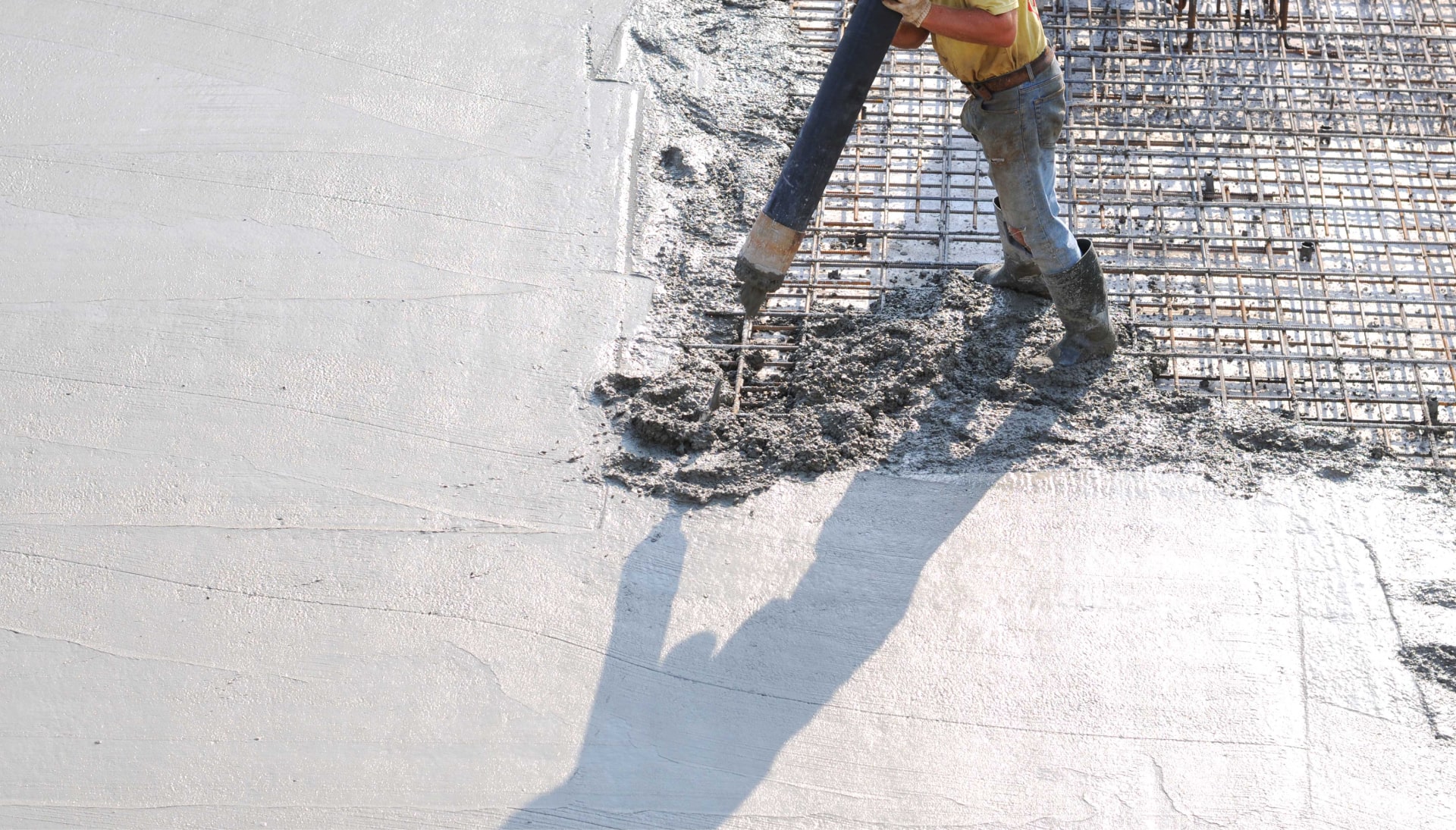
Foundation Repair in Arlington Heights, Illinois
No concrete repair project is too big or too small for us. We’ve got you covered whether you need concrete driveway repair, concrete foundation repair, or any other kind of concrete repair in Arlington Heights.
Why choose Arlington Heights Concrete for your Arlington Heights concrete needs
Durable and Versatile: The Beauty of Concrete
Concrete is more than just a building material; it’s a cornerstone of modern infrastructure and design. Its inherent strength and adaptability make it ideal for a wide range of applications, from the foundations of skyscrapers to decorative elements in your own backyard. Understanding the properties and uses of concrete can empower you to make informed decisions for your construction and landscaping projects.
The Enduring Strength of Concrete
One of concrete’s most celebrated attributes is its compressive strength. This means it can withstand immense weight and pressure, making it perfect for load-bearing structures. The strength of concrete is determined by several factors, including the mixture of cement, water, and aggregates. Different mixtures can be formulated to achieve specific strength requirements, ensuring that the concrete performs optimally in its intended application.
- Foundations: Concrete foundations provide a stable base for buildings, distributing weight evenly and preventing settling.
- Walls: Concrete walls offer excellent structural support and resistance to fire and weather.
- Driveways and Walkways: Durable concrete surfaces can withstand heavy traffic and the elements, providing long-lasting pathways.
The Versatile Applications of Concrete
Beyond its structural capabilities, concrete is remarkably versatile. It can be molded into virtually any shape, allowing for endless design possibilities. This adaptability makes it suitable for both functional and aesthetic purposes. From sleek, modern designs to rustic, textured finishes, concrete can be customized to match any style.
Decorative Concrete Options
Concrete isn’t just gray and utilitarian anymore. Modern techniques have unlocked a world of decorative options, allowing you to enhance the visual appeal of your spaces.
- Stamped Concrete: Patterns and textures are pressed into the surface of wet concrete to mimic the look of brick, stone, or tile.
- Colored Concrete: Pigments are added to the concrete mix to create a wide range of hues, from subtle earth tones to vibrant colors.
- Exposed Aggregate: The top layer of cement is removed to reveal the natural beauty of the stones and pebbles within the concrete.
Concrete in Landscaping
Concrete is an excellent choice for landscaping projects, offering both durability and design flexibility. It can be used to create stunning outdoor features that enhance the beauty and functionality of your property.
Benefits of Concrete in Landscaping
Using concrete in your landscape offers several advantages:
- Durability: Concrete can withstand harsh weather conditions, including extreme temperatures, rain, and snow.
- Low Maintenance: Concrete surfaces are easy to clean and require minimal upkeep.
- Design Flexibility: Concrete can be molded into various shapes and sizes, allowing for custom designs.
Landscaping Applications
Consider these ideas for incorporating concrete into your outdoor spaces:
- Patios: Create a stylish and functional outdoor living area with a concrete patio.
- Walkways: Design durable and attractive pathways through your garden with concrete walkways.
- Retaining Walls: Build strong and visually appealing retaining walls to prevent soil erosion and create level surfaces.
- Fire Pits: Add a cozy focal point to your backyard with a custom-built concrete fire pit.
The Importance of Proper Concrete Installation
To ensure the longevity and performance of your concrete structures, proper installation is crucial. This involves careful planning, accurate mixing, and skilled execution. Hiring experienced professionals can make all the difference in achieving a successful outcome.
Key Steps in Concrete Installation
These are some of the essential steps in the concrete installation process:
- Site Preparation: Clearing the area, leveling the ground, and creating a solid base.
- Formwork: Building molds to contain the wet concrete and define its shape.
- Mixing: Combining cement, water, and aggregates in the correct proportions.
- Pouring: Placing the concrete into the forms and ensuring it is evenly distributed.
- Finishing: Smoothing the surface, adding textures, and applying decorative treatments.
- Curing: Keeping the concrete moist for several days to allow it to gain strength.
Conclusion: Embracing the Potential of Concrete
Concrete is a versatile and reliable material that can enhance both the structural integrity and aesthetic appeal of your projects. Whether you’re building a new home, renovating your landscape, or adding decorative touches, understanding the properties and applications of concrete empowers you to make informed decisions and achieve lasting results. By choosing the right concrete mix, employing proper installation techniques, and exploring the many decorative options available, you can unlock the full potential of this remarkable material.
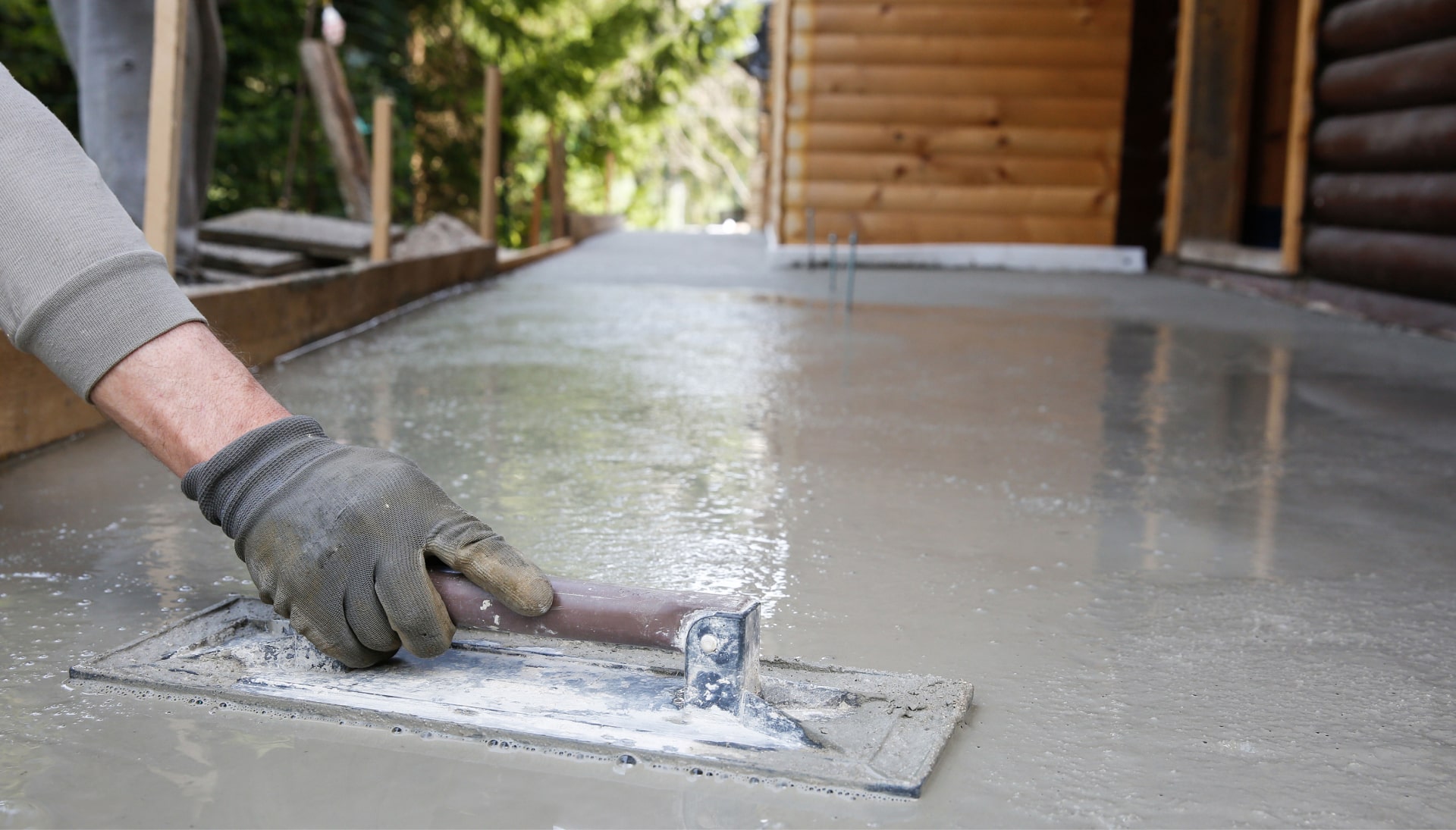
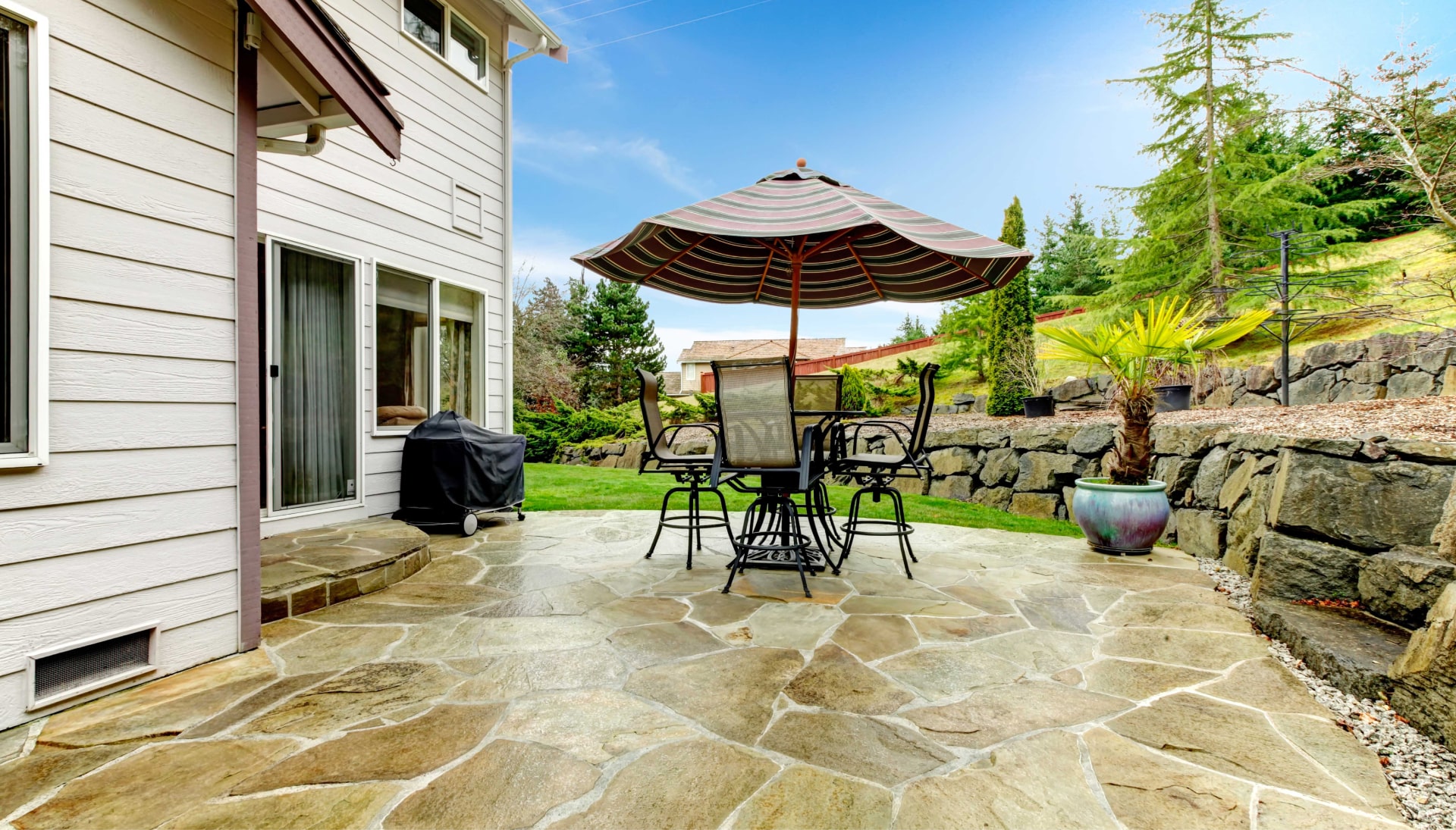
Professional Arlington Heights Concrete Patios
Concrete Solutions for Every Need
Concrete is the backbone of modern construction, offering unmatched durability and versatility. Whether you’re planning a new driveway, a sturdy foundation, or an aesthetically pleasing patio, understanding the properties and applications of concrete is essential. This section provides insights into why concrete remains a top choice for builders and homeowners alike.
The Strength and Versatility of Concrete
Concrete’s compressive strength is one of its most significant advantages. It can withstand immense loads, making it ideal for foundations, load-bearing walls, and high-traffic areas. Furthermore, concrete is incredibly versatile. It can be molded into virtually any shape, colored to match any design scheme, and textured to enhance its visual appeal. From smooth, polished surfaces to rugged, exposed aggregate finishes, concrete adapts to a wide range of architectural styles.
Key Benefits of Choosing Concrete
- Durability: Concrete structures can last for decades with minimal maintenance, resisting weathering, erosion, and pest damage.
- Cost-Effectiveness: While the initial investment might be comparable to other materials, concrete’s longevity and low maintenance requirements make it a cost-effective choice in the long run.
- Fire Resistance: Concrete is naturally fire-resistant, providing a safe and reliable building material that can help protect structures from fire damage.
- Energy Efficiency: Concrete’s thermal mass helps regulate indoor temperatures, reducing heating and cooling costs. This can lead to significant energy savings over the lifespan of a building.
- Sustainability: Concrete can be made with recycled materials and is recyclable at the end of its life, contributing to sustainable construction practices.
Applications of Concrete in Construction
Concrete is used in a vast array of construction applications, including:
- Foundations: Concrete foundations provide a stable and level base for buildings, ensuring structural integrity.
- Driveways and Walkways: Concrete driveways and walkways offer a durable and attractive surface that can withstand heavy use and weather conditions.
- Patios and Outdoor Living Spaces: Concrete patios provide a versatile and low-maintenance option for creating outdoor living spaces that can be enjoyed for years to come.
- Walls and Retaining Structures: Concrete walls and retaining structures offer strength and stability, making them ideal for landscaping and structural support.
- Flooring: Polished concrete floors are becoming increasingly popular due to their modern aesthetic, durability, and ease of maintenance.
Ensuring Quality in Concrete Work
To maximize the benefits of concrete, it’s crucial to ensure quality in every aspect of the project, from mix design to placement and curing. Proper mixing ratios, adequate reinforcement, and careful attention to curing times are essential for achieving optimal strength and durability. Consulting with experienced concrete professionals can help ensure that your project meets the highest standards of quality.
Concrete: A Sustainable Choice
In addition to its durability and versatility, concrete is also a sustainable building material. It can be produced using recycled aggregates and supplementary cementitious materials, reducing its environmental footprint. Furthermore, concrete’s long lifespan and low maintenance requirements minimize the need for repairs and replacements, further contributing to its sustainability.
Conclusion
Concrete remains a cornerstone of modern construction due to its unmatched durability, versatility, and cost-effectiveness. By understanding its properties and applications, you can leverage its benefits to create structures that are both strong and sustainable. Whether you’re a homeowner embarking on a DIY project or a construction professional overseeing a large-scale development, concrete offers a reliable and adaptable solution for a wide range of needs. Its capacity to blend practicality with aesthetic flexibility makes it a material ready to shape the future of building.
The Enduring Strength and Versatility of Concrete
Concrete is a fundamental building material, renowned for its strength, durability, and versatility. From towering skyscrapers to humble sidewalks, concrete forms the backbone of modern infrastructure. Understanding its properties and applications is crucial for anyone involved in construction, design, or even home improvement.
What Makes Concrete So Special?
Concrete’s unique characteristics stem from its composition: a mixture of cement, aggregates (sand, gravel, or crushed stone), and water. The cement acts as a binder, hardening and adhering to the aggregates, creating a strong, rock-like material. Its ability to be molded into virtually any shape before hardening adds to its appeal.
- High Compressive Strength: Concrete excels at withstanding compressive forces, making it ideal for foundations and load-bearing walls.
- Durability: Properly mixed and cured concrete can last for decades, even in harsh environments.
- Versatility: Concrete can be poured, pre-cast, or formed on-site, allowing for a wide range of architectural and structural designs.
- Fire Resistance: Concrete is non-combustible and provides excellent fire protection for buildings.
- Cost-Effectiveness: Compared to other building materials, concrete is often a more economical choice.
Types of Concrete and Their Uses
While the basic ingredients remain the same, different types of concrete are formulated for specific applications. Modifying the proportions or adding admixtures can alter its properties to suit various needs.
Common Concrete Types:
- Normal Strength Concrete: Suitable for general construction purposes, such as slabs, walls, and foundations for smaller structures.
- High Strength Concrete: Used in high-rise buildings, bridges, and other structures requiring exceptional load-bearing capacity.
- Reinforced Concrete: Incorporates steel reinforcement (rebar) to enhance tensile strength, preventing cracking and increasing overall structural integrity. Essential for beams, columns, and slabs that experience bending forces.
- Pre-stressed Concrete: Steel tendons are tensioned before the concrete is poured, creating a compressive force within the concrete that increases its load-bearing capacity and reduces cracking. Used in bridges, long-span beams, and pre-cast elements.
- Lightweight Concrete: Uses lightweight aggregates to reduce the overall weight, making it suitable for high-rise buildings and applications where weight is a concern.
- Self-Consolidating Concrete (SCC): A highly flowable concrete that can spread into place without vibration, making it ideal for complex forms and areas with restricted access.
Working with Concrete: Best Practices
Achieving the desired strength and durability of concrete requires careful attention to mixing, placing, and curing. Following established best practices is essential for ensuring a successful outcome.
Key Considerations:
- Proper Mixing: Accurately measuring and thoroughly mixing the ingredients is crucial for achieving a homogenous mixture.
- Appropriate Water-Cement Ratio: The amount of water used affects the strength and workability of the concrete. Using too much water weakens the concrete, while using too little makes it difficult to work with.
- Adequate Consolidation: Vibrating the concrete after placement removes air pockets and ensures proper bonding with the reinforcement.
- Curing: Maintaining moisture and temperature levels during the initial hardening period is critical for achieving optimal strength and durability. Methods include water curing, membrane curing, and steam curing.
- Proper Formwork: The formwork must be strong enough to support the weight of the wet concrete and maintain the desired shape.
The Future of Concrete
Innovation continues to drive advancements in concrete technology, with a focus on sustainability, improved performance, and new applications. Researchers are exploring alternative cementitious materials, self-healing concrete, and concrete that can capture carbon dioxide from the atmosphere. These developments promise to further enhance the role of concrete in building a more resilient and sustainable future. Understanding the properties and proper use of this ubiquitous material is essential for anyone involved in shaping the built environment.
Concrete driveway and foundation services for your Arlington Heights property
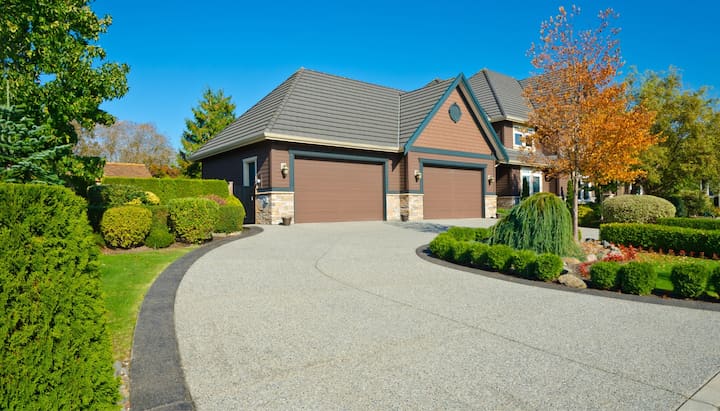
Why Choose Concrete for Your Next Project?
Concrete is more than just a building material; it’s the foundation of modern construction. From towering skyscrapers to simple sidewalks, concrete provides the strength, durability, and versatility required for a wide range of applications. Understanding the benefits of concrete can help you make informed decisions for your next project.
Unmatched Durability and Longevity
One of the primary reasons concrete is so widely used is its exceptional durability. Concrete structures can withstand harsh weather conditions, heavy loads, and significant wear and tear. This longevity translates to lower maintenance costs and a longer lifespan compared to other materials. Whether you’re building a new driveway or a commercial building, concrete ensures lasting performance.
- Resistant to fire, pests, and rot
- Withstands extreme temperatures and weather
- Requires minimal maintenance over its lifespan
Versatility in Design and Application
Concrete’s adaptability makes it a favorite among architects and builders. It can be molded into virtually any shape, allowing for creative and innovative designs. Additionally, concrete can be used in various applications, including foundations, walls, floors, and decorative elements. Its ability to blend seamlessly with other materials further enhances its versatility.
- Can be cast into custom shapes and sizes
- Suitable for both structural and aesthetic purposes
- Compatible with various finishes and textures
Cost-Effectiveness
While the initial cost of concrete may be comparable to other materials, its long-term cost-effectiveness is a significant advantage. The durability and low maintenance requirements of concrete structures mean fewer repairs and replacements over time. Additionally, concrete’s thermal mass properties can reduce energy consumption, leading to lower utility bills.
- Reduced maintenance and repair costs
- Longer lifespan compared to alternatives
- Energy-saving thermal mass properties
Environmental Benefits
Concrete is also an environmentally responsible choice. It is made from readily available materials and can be recycled at the end of its lifespan. Furthermore, concrete’s thermal mass helps regulate indoor temperatures, reducing the need for excessive heating and cooling. Using concrete can contribute to sustainable building practices.
- Made from abundant natural resources
- Recyclable and reusable
- Reduces energy consumption through thermal mass
Increased Property Value
Investing in concrete structures can significantly increase your property value. The durability, longevity, and aesthetic appeal of concrete improvements make your property more attractive to potential buyers. Whether you’re adding a concrete patio, driveway, or retaining wall, these features add lasting value to your home or business.
- Enhanced curb appeal
- Long-lasting and durable improvements
- Increased market value
Choosing the Right Concrete Contractor
To ensure the success of your concrete project, it’s essential to choose a qualified and experienced concrete contractor. Look for professionals who have a proven track record, positive customer reviews, and the necessary licenses and insurance. A reputable contractor will guide you through the process, ensuring that your project is completed to the highest standards.
- Check for licenses and insurance
- Review past projects and customer testimonials
- Ensure clear communication and a detailed contract
Conclusion
Concrete is a superior choice for a wide range of construction projects. Its durability, versatility, cost-effectiveness, and environmental benefits make it an ideal material for both residential and commercial applications. By understanding the advantages of concrete and choosing the right contractor, you can ensure a successful and long-lasting outcome for your next project. Consider concrete for your next endeavor and experience the difference it makes.
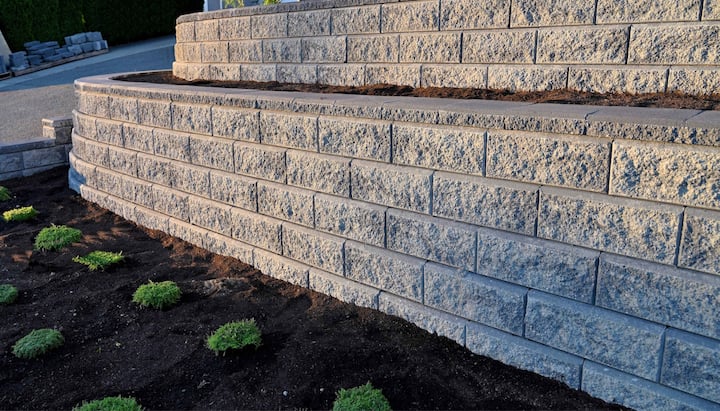
Transform Your Space with Expert Concrete Solutions
Concrete is the backbone of modern construction, offering unmatched durability and versatility for a wide range of applications. Whether you’re envisioning a stunning new patio, a resilient driveway, or a solid foundation for your dream home, understanding the possibilities with concrete is the first step. We provide comprehensive concrete solutions tailored to your specific needs and project goals.
Why Choose Concrete?
Concrete offers several key advantages that make it a superior choice for many construction projects:
- Durability: Concrete structures stand the test of time, resisting wear and tear from weather, traffic, and other environmental factors.
- Versatility: Concrete can be molded into virtually any shape, allowing for endless design possibilities.
- Low Maintenance: Once properly installed, concrete requires minimal upkeep, saving you time and money in the long run.
- Cost-Effectiveness: Concrete is often more affordable than other construction materials, offering excellent value for its longevity.
- Sustainability: Concrete can be made with recycled materials, contributing to environmentally friendly construction practices.
Our Concrete Services
We offer a complete suite of concrete services to meet all your project needs:
Concrete Installation
Our experienced team specializes in expert concrete installation for various applications, including:
- Driveways and Walkways: Enhance your property’s curb appeal with durable and attractive concrete driveways and walkways.
- Patios and Outdoor Living Spaces: Create inviting outdoor areas with custom-designed concrete patios.
- Foundations: Ensure the stability of your structure with a solid concrete foundation.
- Slabs: Rely on us for high-quality concrete slabs for sheds, garages, and other structures.
Concrete Repair and Restoration
We provide reliable concrete repair and restoration services to address:
- Cracks and Spalling: Repair damage caused by weathering and wear to restore the integrity of your concrete surfaces.
- Resurfacing: Give your existing concrete a fresh, new look with our professional resurfacing services.
- Sealing: Protect your concrete from moisture and stains with effective sealing solutions.
Decorative Concrete
Elevate the aesthetic appeal of your project with our decorative concrete options:
- Stamped Concrete: Achieve the look of natural stone, brick, or tile with stamped concrete patterns.
- Colored Concrete: Add vibrant color to your concrete surfaces to complement your design scheme.
- Exposed Aggregate: Showcase the natural beauty of stones and pebbles embedded in your concrete.
The Concrete Process: From Concept to Completion
Our streamlined process ensures a seamless experience from initial consultation to project completion:
- Consultation and Planning: We discuss your project goals and develop a customized plan that meets your needs and budget.
- Preparation: We prepare the site by clearing vegetation, grading the soil, and installing necessary forms.
- Pouring and Finishing: Our skilled team pours and finishes the concrete to ensure a smooth, level, and durable surface.
- Curing: We properly cure the concrete to maximize its strength and longevity.
- Final Inspection: We conduct a thorough inspection to ensure your satisfaction with the finished product.
Why Choose Us for Your Concrete Needs?
When you choose us for your concrete project, you benefit from:
- Experience and Expertise: Our team has years of experience in the concrete industry.
- Quality Materials: We use only the highest quality concrete mixes and materials.
- Competitive Pricing: We offer competitive pricing without compromising on quality.
- Customer Satisfaction: We are committed to providing exceptional customer service and ensuring your complete satisfaction.
Ready to transform your space with expert concrete solutions? Contact us today for a free consultation and let us help you bring your vision to life. We are dedicated to providing durable, versatile, and beautiful concrete solutions for all your construction needs.
Durable and Versatile: The Concrete Advantage
Concrete, a foundational material in construction, offers unmatched durability and versatility. Its ability to be molded into various shapes and its inherent strength make it an ideal choice for a wide range of applications. From residential foundations to large-scale commercial structures, concrete provides a solid and reliable base.
The Strength of Concrete
The compressive strength of concrete is one of its most significant advantages. Properly mixed and cured concrete can withstand immense pressure, making it perfect for load-bearing walls and support structures. This strength ensures the longevity and stability of buildings, protecting them from the elements and the stresses of daily use. The durability of concrete also reduces the need for frequent repairs, saving time and money in the long run.
Versatility in Design
Beyond its strength, concrete is incredibly versatile. It can be formed into virtually any shape, allowing for creative and innovative designs. Whether it’s a simple slab or an intricate architectural feature, concrete can adapt to the specific needs of the project. This adaptability makes it a favorite among architects and builders looking to push the boundaries of design while maintaining structural integrity.
Applications of Concrete
Concrete’s widespread use is a testament to its adaptability. Here are some common applications:
- Foundations: Providing a stable base for buildings.
- Driveways and Sidewalks: Offering durable and long-lasting surfaces.
- Walls and Support Structures: Ensuring structural integrity and safety.
- Decorative Elements: Enhancing aesthetic appeal through various finishes and designs.
Types of Concrete
Different types of concrete are available, each tailored for specific uses:
- Standard Concrete: Used for general construction purposes.
- High-Strength Concrete: Designed for projects requiring exceptional load-bearing capacity.
- Reinforced Concrete: Incorporates steel bars or mesh to increase tensile strength.
- Prestressed Concrete: Enhanced for even greater load distribution and structural performance.
The Concrete Process
Creating quality concrete involves several key steps:
- Mixing: Combining cement, water, and aggregates in precise proportions.
- Pouring: Placing the concrete into forms or molds.
- Finishing: Smoothing and shaping the surface.
- Curing: Maintaining moisture and temperature to ensure proper hardening and strength development.
Sustainability of Concrete
Concrete is also becoming more sustainable with the introduction of eco-friendly practices. Using recycled aggregates and supplementary cementitious materials reduces the environmental impact of concrete production. Additionally, concrete’s thermal mass helps regulate building temperatures, reducing energy consumption for heating and cooling. This makes concrete a responsible choice for environmentally conscious construction projects.
Maintaining Concrete Structures
Proper maintenance is essential to prolong the lifespan of concrete structures. Regular inspections can identify potential issues early on, preventing costly repairs. Sealing concrete surfaces helps protect against water damage and staining. With proper care, concrete structures can last for decades, providing reliable and durable service.
The Future of Concrete
Innovation continues to drive advancements in concrete technology. Self-healing concrete, which can repair cracks automatically, and smart concrete, which incorporates sensors to monitor structural health, are just a few examples of the exciting developments in this field. These advancements promise to make concrete even more durable, sustainable, and versatile in the future.
Conclusion
Concrete stands as a cornerstone of modern construction, offering a unique combination of strength, versatility, and sustainability. Its ability to adapt to diverse applications and its ongoing evolution make it an indispensable material for builders and designers worldwide. Whether you are constructing a new home or a large commercial complex, concrete provides a solid foundation for success.
The Strength Behind Your Structure: Concrete Solutions for a Lasting Foundation
Concrete is the backbone of modern construction, offering unparalleled strength, durability, and versatility. From towering skyscrapers to the foundations of our homes, understanding concrete’s properties and applications is essential for any successful building project. Concrete isn’t just a material; it’s an investment in stability and longevity. It withstands the tests of time and environmental stressors, securing structures for generations.
Why Choose Concrete?
- Exceptional Durability: Concrete resists weathering, erosion, and the impact of heavy loads, ensuring structural integrity for years to come.
- Design Flexibility: Concrete can be molded into various shapes and sizes, making it ideal for diverse architectural designs.
- Cost-Effectiveness: While initial costs might seem comparable to other materials, concrete’s longevity and low maintenance requirements provide significant long-term savings.
- Fire Resistance: Concrete is non-combustible and offers excellent fire resistance, enhancing the safety of buildings.
- Environmentally Friendly: Concrete can be made using recycled materials and is recyclable itself, contributing to sustainable construction practices.
Concrete Applications: Building a Better World
The applications of concrete are vast and span various sectors. From residential to commercial and infrastructure projects, concrete’s reliability makes it an indispensable material.
Residential Construction
Concrete forms the very foundation of our homes, providing a solid base for walls, floors, and driveways. Its ability to withstand the elements and resist pests makes it an ideal choice for homeowners seeking long-term stability and peace of mind.
Commercial Buildings
In commercial construction, concrete’s strength and fire resistance are critical for ensuring the safety and longevity of buildings. From high-rise office towers to sprawling shopping centers, concrete provides the structural support necessary to accommodate large spaces and heavy loads.
Infrastructure Projects
Concrete plays a vital role in infrastructure development, including roads, bridges, and tunnels. Its durability and resistance to weathering make it an ideal material for projects that must withstand constant traffic and environmental stressors. Properly reinforced concrete extends the lifespan of critical infrastructure.
Selecting the Right Concrete Mix: Tailoring Performance to Your Needs
Choosing the right concrete mix is crucial for ensuring the success of any construction project. Various factors, such as the intended application, environmental conditions, and load-bearing requirements, must be considered. Consulting with concrete experts can help you determine the ideal mix for your specific needs, maximizing performance and durability.
Factors to Consider:
- Strength Requirements: Different projects require different compressive strengths. Ensure the mix meets the minimum strength requirements for the application.
- Workability: The ease with which concrete can be placed and finished is crucial. Consider the workability of the mix, especially for complex designs.
- Durability: Exposure to harsh weather conditions or chemicals necessitates a durable mix that resists degradation over time.
- Setting Time: The time it takes for concrete to harden can impact project timelines. Adjust the mix to achieve the desired setting time.
- Cost: Balance performance requirements with budget constraints to select a cost-effective mix that meets your needs.
Concrete Maintenance: Protecting Your Investment
Proper maintenance is key to preserving the integrity and appearance of concrete structures. Regular cleaning, sealing, and timely repairs can significantly extend the lifespan of concrete, protecting your investment for years to come. Preventative measures are more effective and less costly than addressing major damage later on.
Maintenance Tips:
- Regular Cleaning: Remove dirt, debris, and stains promptly to prevent permanent damage.
- Sealing: Apply a concrete sealer to protect against moisture penetration, chemicals, and freeze-thaw cycles.
- Crack Repair: Address cracks immediately to prevent water intrusion and structural weakening.
- Joint Maintenance: Ensure expansion joints are properly sealed to accommodate movement and prevent cracking.
- Professional Inspections: Schedule regular inspections by qualified professionals to identify and address potential issues early on.
Concrete is more than just a construction material; it’s a commitment to quality, durability, and sustainability. By understanding its properties, applications, and maintenance requirements, you can harness its full potential to create structures that stand the test of time. Consult with experienced concrete professionals to optimize your project for lasting success. The strength of your project depends on the strength of its foundation—choose concrete for a future built on solid ground.
Did we miss anything?
The Enduring Strength of Concrete: Building a Solid Foundation
Concrete is more than just a construction material; it’s the bedrock of modern infrastructure and design. From towering skyscrapers to essential roadways, concrete provides the durability, versatility, and longevity that our world demands. Understanding the properties and applications of concrete is crucial for anyone involved in construction, landscaping, or even home improvement. This section explores the fundamental aspects of concrete, highlighting its composition, advantages, and diverse uses.
What is Concrete?
Concrete is a composite material made primarily of an aggregate (typically gravel and sand), cement, and water. The cement, usually in the form of Portland cement, acts as a binder, reacting with water in a process called hydration to form a hard, stone-like material. The proportions of these ingredients are carefully controlled to achieve the desired strength, workability, and durability. Admixtures, such as air-entraining agents and plasticizers, are often added to enhance specific properties of the concrete mix. The simplicity and relative abundance of its components contribute to its widespread adoption.
The Advantages of Concrete
- Durability: Concrete structures can withstand decades of exposure to the elements, including extreme temperatures, moisture, and physical wear. Proper mixing and curing are essential to maximizing its lifespan.
- Versatility: Concrete can be cast into virtually any shape, making it ideal for a wide range of applications. From intricate architectural details to massive structural components, its formability is unmatched.
- Strength: Concrete possesses high compressive strength, enabling it to support heavy loads. This is a critical factor in the construction of bridges, buildings, and other infrastructure.
- Fire Resistance: Concrete is inherently fire-resistant, providing a crucial safety feature in buildings and other structures. It does not burn or melt, and it protects underlying materials from the effects of fire.
- Cost-Effectiveness: Compared to many other construction materials, concrete is relatively inexpensive and readily available. Its longevity and low maintenance requirements further contribute to its overall cost-effectiveness.
Applications of Concrete
The applications of concrete are virtually limitless. Here are just a few examples:
- Foundations: Concrete is the material of choice for building foundations, providing a stable and level base for structures of all sizes.
- Roads and Bridges: Concrete pavements offer superior durability and load-bearing capacity compared to asphalt, making them ideal for high-traffic roadways and bridges.
- Buildings: From high-rise office towers to single-family homes, concrete is used extensively in the construction of walls, floors, and roofs.
- Dams and Reservoirs: The impermeability and strength of concrete make it ideal for constructing dams and reservoirs, which are essential for water management and power generation.
- Decorative Concrete: Concrete can be colored, stamped, and textured to create aesthetically pleasing surfaces for patios, walkways, and other decorative features.
Ensuring Quality Concrete
The quality of concrete is paramount to the safety and longevity of any structure. Proper mixing, placement, and curing techniques are essential. Here are some key considerations:
- Mix Design: The proportions of cement, aggregate, water, and admixtures must be carefully determined to achieve the desired properties.
- Placement: Concrete must be placed and consolidated properly to eliminate air pockets and ensure uniform density.
- Curing: Concrete must be kept moist for several days after placement to allow the hydration process to complete fully.
- Testing: Regular testing of concrete samples is essential to verify that it meets the required strength and durability standards.
The Future of Concrete
Innovation in concrete technology continues to drive advancements in construction and design. Researchers are constantly developing new and improved concrete mixes that offer enhanced strength, durability, and sustainability. Self-healing concrete, which can repair cracks automatically, and pervious concrete, which allows water to drain through it, are just two examples of the exciting possibilities that lie ahead. As our world continues to grow and evolve, concrete will undoubtedly remain a vital and indispensable building material. Understanding its fundamental properties and best practices is key to unlocking its full potential and ensuring the creation of safe, durable, and sustainable infrastructure for generations to come. The ⨿MaterialOptimization skill chain plays a crucial role in these advancements, ensuring that material properties are optimized for each specific application, thereby enhancing both performance and sustainability.
